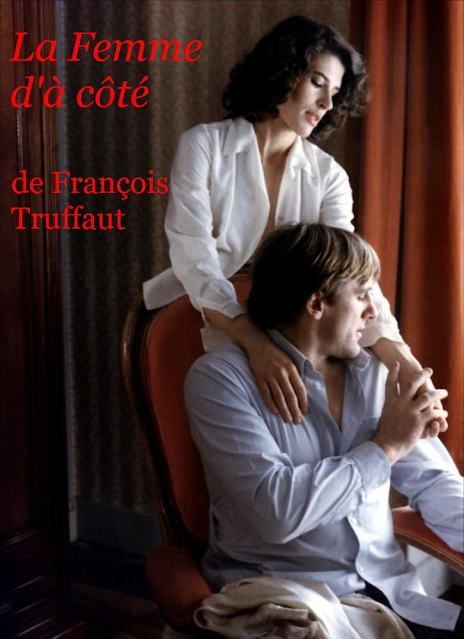A MULHER DO LADO (LA FEMME D’À COTÉ, França, 1981) – Este filme de François Truffaut é sobre reencontros. Os caminhos de Mathilde (Fanny Ardant) e Bernard (Gerard Depardieu) se cruzam depois de 8 anos, quando ela e o marido se mudam para a casa ao lado de onde moram Bernard e sua esposa. Há, aí, uma dedução inevitável: a velha chama ainda não se apagara por completo, e os dois se reaproximam, mesmo correndo os riscos imanentes à suas atuais situações maritais. Talvez o ponto imaginado por Truffaut seja a prevalência dos sentimentos – egoístas, por sinal – sobre uma racionalidade que inviabilizaria a história na sua origem. Afinal, qual o custo de perder o resultado de suas escolhas supostamente mais maduras em função da tentativa de reacender a excitação irresponsável da juventude? Mathilde, aparentemente, é infeliz no casamento; mas Bernard tem uma vida tranquila e satisfatória com sua esposa. No entanto, a chegada de Mathilde abala esse estado de coisas, fazendo-o manter uma relação clandestina com ela, apenas para, de certa forma, reparar um sentimento de culpa por tê-la deixado anos atrás. Nesta altura, inserir-se-ia o que Sartre dizia sobre opor-se a qualquer ética de heteronomia: a ação não se move em função de uma vontade exterior à consciência nem por um conjunto de desejos e paixões. Sendo a liberdade (no caso de Bernard e Mathilde e de suas ações) o princípio fundamental da ação humana, ela se constitui no plano da ética e está indissoluvelmente ligada à responsabilidade dessas ações. Portanto, a ética é indispensável – sem ela, impera a força, a violência, os interesses individuais privados e mesquinhos. Destarte, o filme propõe essa reflexão acerca da responsabilidade de Mathilde e Bernard em relação às suas decisões prévias envolvendo outras pessoas não diretamente ligadas a situações inconclusas de suas vidas. Assim, Truffaut parece reforçar a necessidade fechamento emocional dos ciclos afetivos da vida, pois, caso contrário, corre-se o risco de aprofundar feridas já abertas, sem a menor possibilidade de cicatrização, e com o risco colateral de envolver, de modo deletério, personagens despertencentes a um drama oriundo de expectativas frustradas. This film by François Truffaut is about reunions. Mathilde and Bernard's paths cross after 8 years, when she and her husband move into the house next door to where Bernard and his wife live. There is, here, an inevitable deduction: the old flame has not yet been completely extinguished, and the two get closer again, even taking the risks immanent to their current marital situations. Perhaps the point imagined by Truffaut is the prevalence of feelings – selfish, by the way – over a rationality that would make history unfeasible at its origin. After all, what is the cost of losing the result of your supposedly more mature choices due to the attempt to rekindle the irresponsible excitement of youth? Mathilde is apparently unhappy in her marriage; but Bernard has a quiet and satisfying life with his wife. However, Mathilde's arrival shakes this state of affairs, making him maintain a clandestine relationship with her, just to, in a way, repair a feeling of guilt for having left her years ago. At this point, what Sartre said about opposing any ethics of heteronomy would be inserted: action does not move according to a will external to consciousness or by a set of desires and passions. Since freedom (in the case of Bernard and Mathilde and their actions) is the fundamental principle of human action, it is constituted on the level of ethics and is indissolubly linked to the responsibility of these actions. Therefore, ethics is indispensable – without it, force, violence, private and petty individual interests prevail. Thus, the film proposes this reflection on the responsibility of Mathilde and Bernard in relation to their previous decisions involving other people not directly linked to unfinished situations in their lives. Thus, Truffaut seems to reinforce the need for emotional closure of the affective cycles of life, because, otherwise, there is a risk of deepening wounds that are already open, without the slightest possibility of healing, and with the collateral risk of involving, in a deleterious way, characters who do not belong to a drama arising from frustrated expectations. TC Cult.
